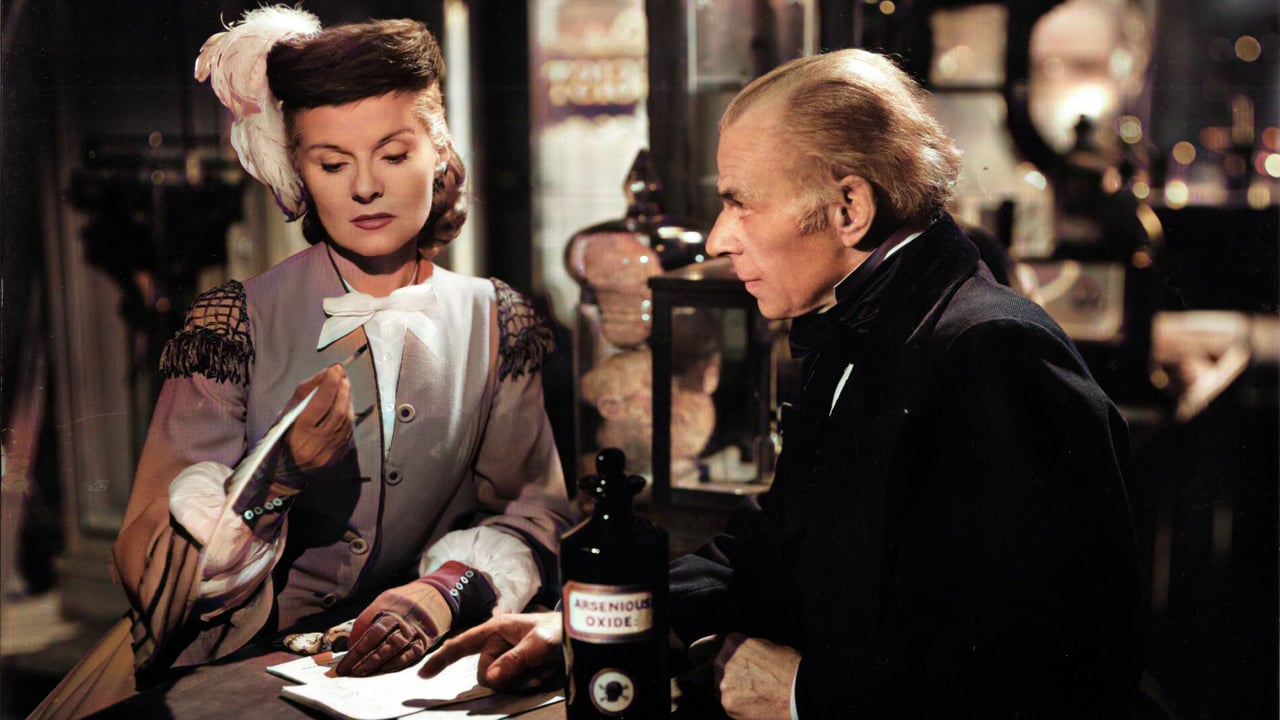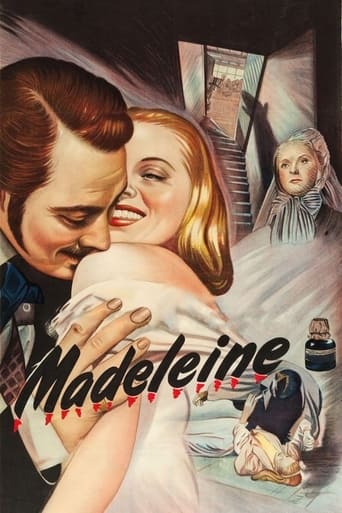

Wow! Such a good movie.
... View MoreEasily the biggest piece of Right wing non sense propaganda I ever saw.
... View MoreThis is one of the best movies I’ve seen in a very long time. You have to go and see this on the big screen.
... View MoreGreat movie. Not sure what people expected but I found it highly entertaining.
... View More"Madeleine" is possibly David Lean's most underrated film, perhaps because of its slow pace and the miscasting of Lean's wife Ann Todd in the title role, (though I think she makes a fair stab at the part). Based on fact, it's the story of Madeleine Smith who stood trial for the murder of her lover in Victorian Glasgow. As her French seducer, Ivan Desny is excellent, as is Leslie Banks as her stern father and the film looks wonderful thanks to Guy Green's gorgeous black and white photography and John Bryan's set designs while Lean's direction is as impeccable as ever. If the film has a fault it's a certain stiffness in the telling. Not much seen nowadays but essential Lean nevertheless.
... View MoreAs you will know from reading other reviews this film is based on a true crime from Scotland in the 1850's.The question is: what does David Lean make of this material? At first he seems to be making a study of the repression of women in Victorian society. Madeleine Smith's life at home is dominated by a stern father who expects his daughters to do their duty by him, even changing his shoes! The bars on Madeleine's bedroom windows are a not too subtle symbol of her caged existence. A breath of freedom and excitement seems to come in the form of a lover, but even he just wants to use Madeleine to advance his social position and can be brutal when his ambition is frustrated - he is certainly not a romantic hero. It is interesting that on the two occasions when we can clearly infer he and Madeleine make love (the first time against the background of a Scots ceilidh, which makes for some very erotic imagery), it is done from a position of dominance on his part, he is literally standing over her.The man Madeleine is expected to marry seems honourable and decent, but he too will prove incapable of loving her as a real person - she must be flawless. When the lover turns to blackmail it seems Madeleine has no way out but to turn to poison.Now the film becomes a courtroom drama. Do we want to see Madeleine acquitted or not? Did she poison Langelier? The end of the film answers this question with an enigmatic smile into the camera from Ann Todd (the 'fourth wall' is broken several times in the film).What we are left with, then, is a film which appears to start from a feminist viewpoint, then becomes a romance, then a crime procedural. From being deeply involved in Madeleine's story, we become distant from her when she is charged with murder. Ultimately we don't really care about her fate, and an unsolved crime is always strangely unsatisfying.There are some great moments of cinematography (particularly deep-focus photography) and image-making here, but the film is not quite a satisfying whole, with too many loose ends (her family's reaction, for example; I'm sure 'Papa' was outraged but he still provided the best lawyer he could find) to make a rounded drama.
... View MoreIt should come as no surprise that the trial of MADELEINE may well have been termed "the trial of the century" in 1857's Scotland. And from this true story, David Lean has made a period romance starring ANN TODD as the scheming woman from a wealthy background who feels compelled to hide her love affair with a commoner from her disapproving father.Madeleine defies the conventions of her stiff upper-class household and, after receiving a proper gentleman caller with her family, retreats to her private room where she has an assignation with a lover who is not a man of means. The shadowy interiors suggest the menace to come, as her father urges her to take a suitable suitor in marriage as soon as possible.What hurts the story is the familiarity of it all--a woman of substance wanting to break out of the social boundaries of convention. And unfortunately, there is nothing novel or different about this version of such a tale to make it of more than routine interest, despite the David Lean touch. What it really needed was Alfred Hitchcock's guiding hand.All of the technical ingredients are fine but the script is ultimately a disappointment and tends to be dull in spots. Furthermore, Ann Todd's Madeleine is not a very arresting character. This has to be considered one of David Lean's less effective films. The story is as emotionally cold as Madeleine herself and her demure behavior with her father seems more like a pose than anything else, one that he should easily be able to see through. Her arrest for murder in the poisoning of her lover is handled with too many frigid close-ups of Todd's face and no real explanation of what happened.It's certainly not a "must see" film by the renowned directed Lean.Best performance in the entire film: ANDRE MORELL as the defense counselor who gives the most stirring and satisfying speech in the courtroom as to why Madeleine should be found innocent of the circumstantial evidence.
... View MoreDavid Lean's film Madeleine tells the true story of Madeleine Smith, a young woman from an upper-class Scottish family, who was tried for murdering her lover in 1857. The case, which was a media sensation in its day, ended with Ms. Smith being released after the jury reached the verdict of "not proved", which, in Scottish law, meant there wasn't enough evidence to convict her but sufficient evidence to entertain doubts about her innocence. The movie maintains the same ambiguity about her guilt or innocence of the crime, indeed ending with a voice over narrator asking the title character as to whether she was guilty or innocent. She just looks at the camera and gives a vague half smile that could mean either of the two.The strengths of the film are considerable. The lighting and overall cinematography give the film both a wonderful Victorian-era feel and a film-noir aspect as well. Indeed, the film has much in common with film-noir aside from the lighting. The story, like many noir films, has a dubious heroine who leads a fundamentally disadvantaged man, in this case, a lover from the wrong side of the tracks economically and socially, to his destruction. Indeed, given the situation presented in the film, the lover couldn't have realistically expected Madeleine's domineering and strict father to have ever accepted him given his poor social and economic prospects. Adding into the mix was Madeleine's own ambivalent handling of their relationship, promising one moment to tell her father about them, then pleading it was too difficult to do so. As history indeed bore out, it was a recipe for personal disaster.My main criticism of the film is that virtually nothing is told of how Madeleine managed to meet her lover in the first place. Some accounts I've read indicated that they first met in a Glasgow park. I think Lean should have shown that meeting to show how Madeleine had a mind of her own and how willing she was to defy her conventional and strict Victorian father. That would have added to the ambiguity of Madeleine's character, seemingly compliant to the demands of her family in terms of love and marriage and yet defiant of them as well.Still, the performances, especially Ann Todd as the title character, are top notch and this is a film well worth seeing. As I've said, this is the closest David Lean came to film-noir that I've seen.
... View More